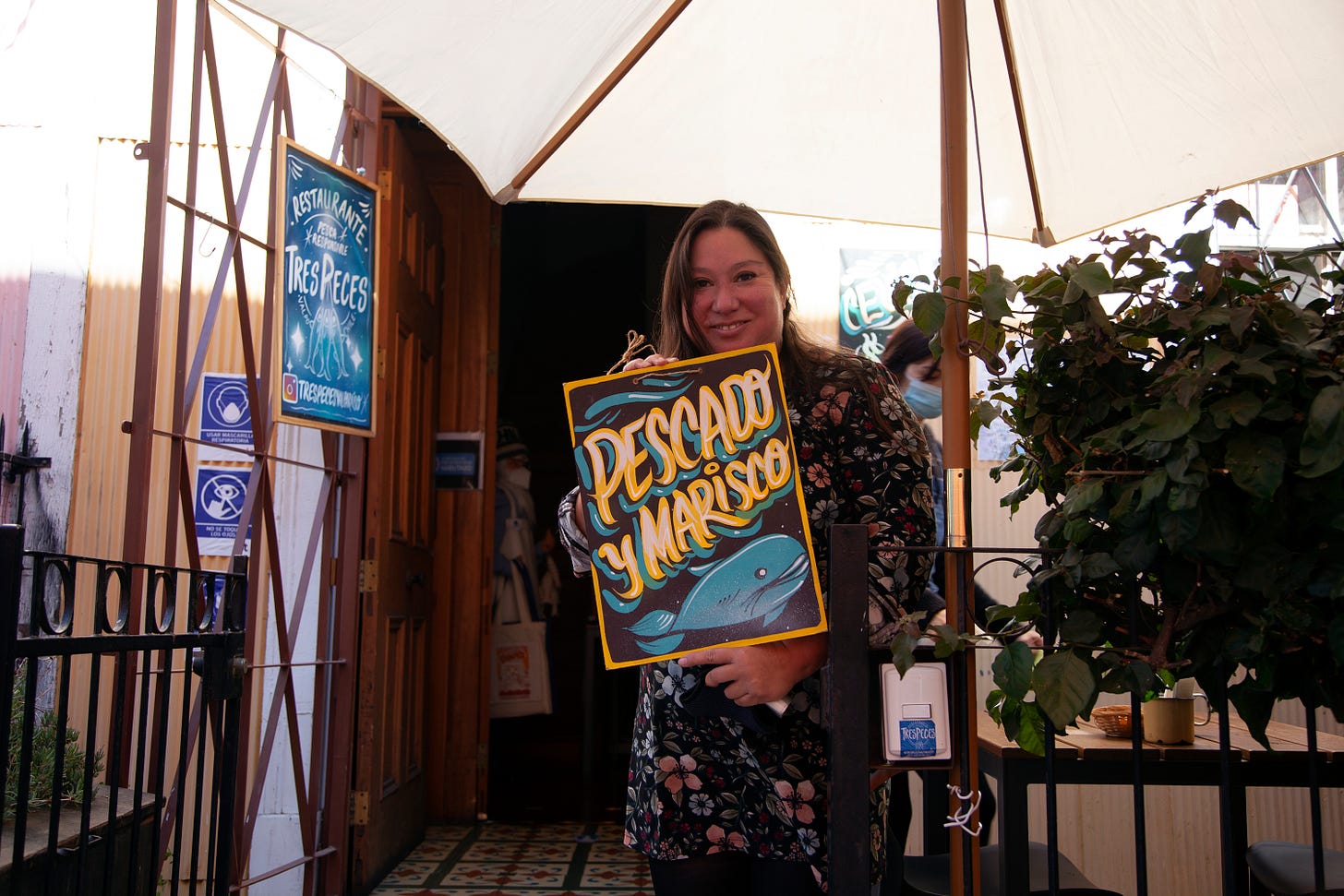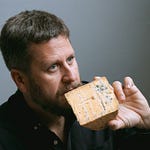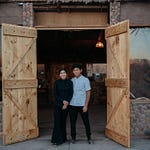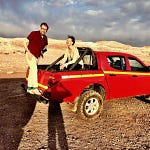Meyling Tang is one of the founders of Fundación CocinaMar, a non-profit organization based in Chile that promotes the well-being of the country’s fisheries and the people that work within it, as well as the seafood restaurant Tres Peces in the port city of Valparaíso. She is also a journalist, specializing in the research into global fisheries. She is perhaps the best person to speak with regarding seafood in Chile and I have been following her work for probably a decade. She has a lot going on with all of her projects and I’ve had the chance to see many of them up close while traveling in Chile. We speak a lot about her restaurant and how she really is breaking with tradition in terms of sourcing and logistics, opting to work directly with fishermen in a way that is mutually beneficial. We also touch upon this idea of the restaurant as a hub of storytelling, something I think can be incredibly powerful.
Did you know that you can also listen to the New Worlder podcast on Apple Podcasts, Spotify and most other podcast networks?
Partial Episode Transcript
Chileans and their connection to the sea
Meyling: I'm from the south of Chile and I started a career in journalism 20, 25 years ago. When I finished studying, my options were too few. I think in Chile, we have a lot of universities, but little possibilities for work. I was living in Puerto Montt, one of the biggest areas of the salmon farming industry. So, my first job was working as a journalist in a specialized aquaculture magazine. I think for the first three months, I didn't understand what it was that I was writing. I learned a lot about the importance of the sea, the importance of gastronomy to connect to people.
When I was in my 30s, I decided to move to Galicia [Spain], to Santiago Compostela. I was lucky enough to do that. In Galicia, I really connect with what I'm doing right now. In Galicia, in Santiago Compostela, in the northern part of Spain, they really love seafood. They are so proud about the products and about their seafood. If you invite someone to your home, they will offer the best of what they have. Of course, there are mussels, crabs, the best fresh fish…when I returned to Chile, that was 10 years ago, I moved to Valparaiso, which is really close to Santiago and I realized that we didn’t have that connection. Chileans didn't connect with the sea, or the amount of seafood that was available from our ocean. That's why I started to work on fish consumption, to promote fish consumption and to connect fishermen with gastronomic sector.”
Nick: Why do you think that is? Why do you think Chile doesn't have that connection to the sea? I mean, the whole country is coastline. It's 4000 kilometers of coast and you're never far from the ocean. The seas are amazingly rich and diverse. Why don't Chileans have that connection?”
Meyling: “I think there are a lot of reasons, but one is that we are focused on exportation. We have a lot of sea, we have a lot of seafood. We have more than 200 different species that we can capture. And we can farm from the sea. But everything is for export. So, we're not focused on the domestic market. If you think about our government, or the institutions that need to be focused on seafood consumption, no one is focused on food for the domestic market. We are focused on what you can capture from the sea if it's legal or not. The season that you can capture. These are all technical issues, more than the importance of these fish that can come to your home. So for many years, the fisherman in Chile – more than 90,000 people and more than 500 fishing villages in this long coast – didn't have the skills to sell the fish directly, because we didn't care about domestic market.”
Nick: “The fish just stays in the port areas basically, unless it's being exported.”
Meyling: “Yeah. So, you are on the boat. You have the fish at the beach and a truck comes and then the truck goes to another area where the fish can go abroad by airplane or boat. But fisherman haven’t have been involved in this business at all. I think this changed 10 years ago, five years ago, when they started to learn some of these skills and to have different projects. I think one of the biggest tools is Instagram, all this social media, so they can show what they're doing on the boat.”
Nick: “It gives them that direct connection to the consumer. So, I was I was working on a cruise ship recently that was that went along the entire coast, from Arica to Punta Arenas, and we stopped, everywhere along the coast. I've been to all of Chile's coastal cities before, at least most of them, but this was the first time it was all at once. For the first time I could really get a sense of just how rich and how vast Chile's seas are. In every port, there was a lively fishing community, and I could walk into the local market, and there was always something different than that the last port. For me, I always think of when I'm traveling and Chile to eat seafood. That's what I want because I know how rich it is. I know how amazing the products are. But to Chileans, the consumption of seafood it's weirdly low, right?”
Meyling: “It's between 10 kilos per capita, and 18 kilos per capita. Of course, it's different if you're living in a village that is next to the coast. Or if you have some friends that are fishermen, then you will have amazing food as you just said. But still, there's not a political program to increase the local consumption of seafood, and to understand how important it is for health.”
Nick: “I'm trying to think of a seafood market away from the coast, like in Santiago…”
Meyling: “There's only one, the Terminal Pesquero. Of course, they concentrate like 50% of the fish consumption in the area, of course, but we don't have the same thing in the regions, and, as just said, we are 4000 kilometers long. So, we need to connect between the cities, not only centrally. We create a foundation that is called CocinaMar eight years ago. We are four friends that were involved in the fishery sector and we understood that we need to have some channel to show the work that fishermen have been doing for many years, and also to teach the cooks in the restaurants and the community what is available from the sea.
If you visit Chile, you will find no more than 10 options of our seafood in most restaurants. There might be conger, hake, loco, Chilean abalone, machas…that is not all the richness that we have. We have a lot of seaweed, crustaceans, sea urchins. We are the most important sea urchin exporter in the world, but you don't find easily at restaurants so that's something that we need to change. And of course, it depends on the logistic. It depends on many middlemen between the boats and the supermarket and businesses like restaurants.
So, when we started Tres Peces, that is the restaurant we own in Valparaiso, we decided that we will buy directly from artisanal fishermen. This is something that everyone can do. We decided that we will pay at the same day that the fish arrive, and this is not something that is easy for our business. And we decided that the menu should be flexible to change, depending on what is on the boat.”
Nick: “I'm thinking of my travels in Chile and most of the menus are the same 10 fish, as you said. It's definitely not a reflection of how many species are there and being caught. I think people prefer artisanally caught seafood, but I think just prices tend to be high because of all the intermediaries.”
Meyling: “That's right. There are more or less five or six people, middlemen, between the boat and the supermarket. So that's why in Chile seafood is so expensive. But if we try to reduce that, and we have only one, a good one, that can sell you, fresh fish, frozen fish, smoked fish, it changes everything. So that is the thing that we have been doing for the last five years in Tres Peces. Everything that we buy is from artisanal fishermen, everything is a small-scale aquaculture, and the price that we pay is decided by the fishermen. For us, this is Fair Trade. For us, is something that is needed not only in one small restaurant, but it is also needed for Chile. It is also needed for the people that visit us, but also for Chileans to try and learn more about what we have available from the sea.
I said that there are 200 different species that are legal to capture by Sernapesca, our fisheries authority, but we have more than 1000 different species at the sea that we haven't even started to research. You can imagine what is the value of all of these resources for gastronomic issues or medical issues to be more connected to the sea. If you think about our story in Chile, maybe we're more connected with the farm, with the country. All of the sanctuary areas in Chile, where the politicians make the decisions, is not connected to the ocean. That's one thing that we need to change. In our work it is possible to visit our fishing villages, to make contact with many people, amazing people, and we know what is possible. We have a restaurant that, for the last five years, has been buying fresh fish, frozen fish and smoked fish directly from fishermen. There is not one day that we haven't had anything interesting on the menu. When we started many people, many close friends, said to us, this will not work, not at all. You need to have some meat. You need to have some Italian pasta. You need to have some food for people that don't want fish or seafood or for the children. We don't have a children’s menu and we don't need French fries.”
Nick: “I think people get too comfortable in how they set up their menu sometimes and they don't want to take any risk. It's really hard to make a restaurant work without taking any risk with your menus. I mean, you can make it easy and just get by but then something happens and the price goes up and a supply chain breaks and then you're out of luck.”
Meyling: “Or you have a pandemic.”
Nick: “That's what I was going to say but I didn't want to say it.”
Meyling: “For example, for us, for Paula and me, the owners of Tres Peces, we know that this relationship that we have with the fisherman, this connection that we have between us the restaurant possible that the restaurant is still alive. We decided five years ago that we need to connect to these people to make a business. In Chile, especially in Valparaiso, we had a lock down that was terrible. More than 200 days, I think I don't remember exactly, but many months that we couldn't move from our homes. We decided to start a delivery system for our seafood, our dishes, our menu and the fishermen wanted to give us the fish for free. They wanted for this model of business to still be working and that was amazing. Of course, we paid for the fish, but at the beginning the banks didn't give us any options for our business. The government didn't make any solutions because it was something that was a problem for all the sectors, not only for the gastronomic sector. We started to sell different not only prepared foods, also fillets and smoked fish. We started to develop different formats that we can get to homes because people couldn't move, they couldn't go to the supermarket. That connection for us is one of the keys that this is still alive and working and people are still enjoying the fresh fish that we have.”
On the sustainable seafood model of Tres Peces
Nick: “You really created a model where you depend on the fisherman and the fishermen depend on you. And it's a very reciprocal relationship in a very sustainable way.”
Meyling: “It's really fascinating because we have the restaurant. That's a thing that maybe someone from outside can understand. We have a seafood restaurant in Valparaiso, that is called Tres Peces. We work from Wednesday to Sunday and when we close the door, maybe people can think, okay, they stopped working because we aren’t receiving more clients. But the thing, for me at least, Tres Peces is a pilot. It is something that you can….”
Nick: “It's a model that that could be replicated.”
Meyling: “It's also a window for many fishermen. They can show what is happening in their fishing village or on the boat. The first question we ask our fishermen is, what do you have that is not selling? What fish do you catch or is in the water but there is no commercial interest. Then they sell us amazing fish that they bring us because there wasn’t a market for them.”
Nick: “What types of fish?”
Meyling: “For example, we work with Robinson Crusoe Island. Juan Fernández Island. Over there, 85% of the fish are endemic. They don't even have a code from our fishing authorities to sell it because they don't exist in the paperwork.”
Nick: “What is exported from there, just lobster?”
Meyling: “Yeah. And they also have a huge crab that is really well known. They have caught. They have a fish that they call it salmonete. This is a rock fish. They have a mackerel, but it's from Juan Fernándezso it’s different from the mackerel from Chile. They have Morena, chancharro…they have amazing endemic fish that they use for the soup with pasta, when there is no lobster.”
Nick: “Whatever they can use it with, because there's no point of sale for it.”
Meyling: “Yeah. And if you think they're like 600 Meridian miles away from Chile, so they're connected with the continent only by one boat that brings food and things. And with that big boat, they sell us the fish. They have a processing plant or Robinson Crusoe Island, and we work with Daniel Gonzalez, who is the president of the organization of fishermen. But also, they have a company that is called Mar de Juan Fernández, and they capture fresh fish and they process it and make fillets, then they freeze it and they sell it to us in Valparaiso. So, when the boat came, I didn't know what I just bought, I only know when my invoice and I said OK. I had 50 kilos of that. 25 kilos of that. Okay, Paola. We have that. Think about the menu. So that's amazing. So, everything that they had on the boat. They have an endemic octopus. This octopus eats the lobster and is a headache for the fishermen because it goes in the traps. But the flavor, the taste is amazing.”
Nick: “I saw you were making octopus and cheese empanadas. That sounds amazing.”
Meyling: “I think it is so interesting, so magical, what we can do now because at the beginning, we would start a business and this takes you 100% of the energy you need to pay the bills. You need to hire people. But now that we are on our fifth year, I know now we can create other things and we can connect other people. We have a foundation; we have the restaurant and we have a cooperative also where we organized with women in the south. We have a model of business that is called Aqui Pescado, that sells a package of seafood to your home.”
Nick: “So a subscription, like a seafood CSA, and that's available all over Chile.”
Meyling: “It started only in one region in the south, and in Valdivia, Region de los Rios. Also, we have been doing this in Valparaiso at the restaurant, because it's simple, we have the clients. But it's a model that we wanted to export to other areas, Coquimbo, but all other areas in Chile. When we started the business in Tres Peces, as I told you, many people said to us, this will not work at all. Fishermen will not sell you the fish. People will want meats and children will want other things.
Now we know that there are more fans of seafood than we can imagine. We have people waiting at the door when we open the restaurant and people say goodbye with a kiss. These are not friends, they are people that just came early, for 30 minutes to eat something, but then they leave so happy because they had this experience. Maybe they remember some fried fish or some soup that they used to eat when will they were a child and for us it is so important that people reconnect to this world of seafood and to learn more about the stories that are related. With Daniel Gonzales, with Juan Garcia, with all the people that are involved in the process of catching and finding these products that arrive to Tres Peces. So, for me, the restaurant is like an open window with how we can show this. Then of course you can have the experience of it. Amazing food is something that gives me the opportunity as a businesswoman to sell and to buy fish and pay the same day. For us it is amazing.”
Nick: “The foundation, CocinaMar started in 2016, right? It's a private nonprofit organization and it promotes the well being of Chilean fisheries and the people that work in it. How many fishermen do you work with?”
Meyling: “We have a network of more than 40 different organizations, all around Chile. We have developed more than 20 different projects. This week, we are traveling to the south of Chile, Puerto Montt, to organize a seafood consumption weekend with some restaurants. All things that we have been doing for this all these years has been connecting people. Connecting fisherman with chefs, with the community, with the government and to show that there are some people that want to eat fish.”
Nick: “The restaurant opened in 2020, so it's newer. Is there something the restaurant can do in telling stories in a way that the foundation couldn't?”
Meyling: “Definitely, as a journalist, I attend many Congress events, telling people that they need to buy fish from this fisherman, that their telephone numbers are on the website. For the last I don't know, eight years, they're over there. We Instagram, Twitter, Facebook, telling all the people that if they want the option of the business it is over there. But it wasn’t at the moment that we open Tres Peces, where we really cooked the fish. We really started making some noise in the media and at gastronomic events, where other restaurants started to look that this could be an option.
So for me, at least, I think that with Tres Peces, we can show that the model of business is working. I can hire 10 people at the restaurant, I can pay all my bills, we can cook something that is really delicious, and at a fair price for the people. One of the reasons of course, is because we don't have anyone between the fishermen and ourselves that are buying the fish. If we reduce the amount of the other payments for the fish and seafood, we can have a business that is in good health.
So now, we go to a Congress or events or gastronomic festival to tell what we are doing. It's not something that we’re telling you from the outside. I'm in the business. And we passed through all the prices from the pandemic and we're still alive as I told you, and we still have the energy to make more things. For us, Tres Peces is a sign that it works. If you can connect with fishermen, not from Arica or Punta Arenas, please go to the closer fishermen to ask for someone that can bring you fresh fish. Maybe it will not be on 100% of the menu, maybe not 80% of the menu, but maybe it can be a special of the day. Maybe you can have a dinner special or something that there's a special fee with. But I think for us, it's really important that we can tell the story about the products that are behind the other recipes, all the food that we offer at Tres Peces. With CocinaMar we have some projects that are bringing the skills for the fishermen to sell. But I think the trust and all the magical issues behind cooking something I can tell it throughout Tres Peces.”
Nick: “I think that's kind of what can be amazing about restaurants. My writing is similar to what you're doing with CocinaMar in the sense that it can be sometimes about technical things, about sustainable development and different species, but it only reaches a certain type of person. It only reaches the people that are really interested in it. That are really looking for it. But with a restaurant, you open up these stories to a whole different group of people. You can communicate this information in a way that words on a page cannot. They taste it, they see it, they smell it.
If they are really interested in it, they will read it and absorb that information, but the average person, they don't take that time, and they don't have that time. But when they go to a restaurant, they taste it. And I think that's restaurants can be extremely powerful in that way, especially if we use them like this more often. And I think a lot of the restaurants that talk about sustainability and helping farmers and fishermen, they can replicate models like yours. I think that's far more effective than just putting a garnish on a dish and saying it was from wherever.”
On seaweed and giant squid
Nick: “You sell a lot of seaweed at the store in Tres Peces and a ceviche de cochayuyo sometimes on the menu there. Are Chileans eating seaweed?”
Meyling: “They used to.”
Nick: “I think that's everywhere, like we all used to. We stopped. How do we get people to eat it again?”
Meyling: “I tell people to erase all the bad memories they had with some products. For example, the cochayuyo. Some people will remember a pot that is boiling, but with a bad smell and they think that is the cochayuyo. Not at all. If you try the cochayuyo as a ceviche or with sesame oil or Asian style it is a completely different thing. I'm really happy that I think there are more people in Chile that are thinking the same. We have Navidad, a small fishing village, and Cecilia Masferrer, a woman that understood many years ago that we need to increase seafood consumption. She's one of the leaders of a fishing organization and she attended Expo Milan few years ago with a cochayuyo product. And in Italy, these small bags were made with a lot of effort from a small-town fire five hours from Santiago, with branding in Italy, and they sold it in three weeks. The entire amount of products that they wanted to sell in five months at Expo Milan they sold it in three weeks. And Cecilia also is an algera, she had the opportunity to attend to Asian countries visiting so he she has learned a lot of what should happen here in Chile. There are lot of people that are trying to make efforts to make more seafood available on our tables and on our menus. There's a woman, Paz Escandón, that wrote a recipe book that is called Algas Pacíficas. Her child had a problem with food, and she understood that seaweed could be an option, but when she tried to cook for her children she didn't find any recipes and she created the book. So, we're not alone.
Nick: “I know you're not alone. I think it's all over the world. Where I am in the northeastern United States, there is lots of seaweed growing and there are people starting to farm seaweed now, but I don't know anyone that their families have cooked seaweed historically. It's like reintroducing a new product, even though it's something abundant and something around. I think you have to be creative and try new ways. And we have to look for new recipes and share recipes and that will change. It’s such a healthy thing and it makes no reason why we're not eating it.
What about like the health of Chilean seas? How healthy are they in terms of overfishing, pollution and the damage from aquaculture, industries and things like that?”
Meyling: “We have a lot of problems, but still we have seafood available.”
Nick: “It's still quite okay, despite issues.”
Meyling: “I always think that this is not copper mining. When you're focused on copper, you extract and then you will not have anything. In fisheries, if you make decisions, fishery management decisions, you can have fish forever. For example, Daniel Gonzales from Robinson Crusoe island, he told me once that he captures only 1% of the fisheries available in Robinson Crusoe Island. If we have another crisis, he told me that he can feed all Chileans, only with fish. Can you imagine the amount that we have?
Again, the problem is that we are focused only on five species. We are focused on common hake and Chilean abalone, and all the efforts go over there. We export because they have the market, but then we get overexploitation of our fisheries. It is true that if we can keep, we can maintain and we can have seasons of extraction from catching, the fisheries can recover. And that's why it's so important to understand that we have 200 different species. So, when common hake is growing, and reproducing, we can go and make the effort to other species. Of course, it's not easy to open new markets, but again, we have Chile, the domestic market, that wants it. They want to learn more about us and the support of chefs and cooks has been amazing, especially for Fundacion CocinaMar.
At the beginning we didn't have any money. We had ideas and we asked many people to join us and to teach and commit to with cooking classes and some degustations to try giant squid or species that are in the sea but not with good awareness about them. That's when I met Paola, my partner at Tres Peces, it was like that. I met her at a congress and I told her I wanted to do something in Valparaiso with some neighbors, and she came with a table and we cooked some giant squid. I think there's the interest for people to learn more and of course the restaurant to cook different things.”
Nick: “I think the giant squid is a good example. It's something that's really abundant. There's lots of it, but no one really knows how to cook it. You see it in the market and it's like these thick white chunks. And you're like, what is this? What do I do with it? And if you cook it wrong, it kind of has a strange texture, I think. But it can be really delicious. It's something that can be really amazing and it’s not that difficult to cook. It's just you have to know what you're doing.”
Meyling: “On the other side, everyone loves fried calamari, but they don’t trust giant squid, which is the same. At least in Chile, I think there's a huge change that is happening with fishermen. Now they have processing plants. Now they have trucks. They can sell directly to your or at the door of your restaurant. Sometimes we put pictures in our Instagram at Tres Peces. The machas or the oysters or the scallops just arrived at the door of our restaurant.
Also, another thing is that restaurants think that they need to sell only fresh fish. And that's not true. You can buy frozen fish. Frozen fish prepared in a small processing plant is different than in an industrial plant. It is just like fresh fish. It's really a good quality of products, because fishermen are catching it, making the fillet and freezing it in the same day.”
Quotes from this interview have been gently edited for context and clarity.














Share this post